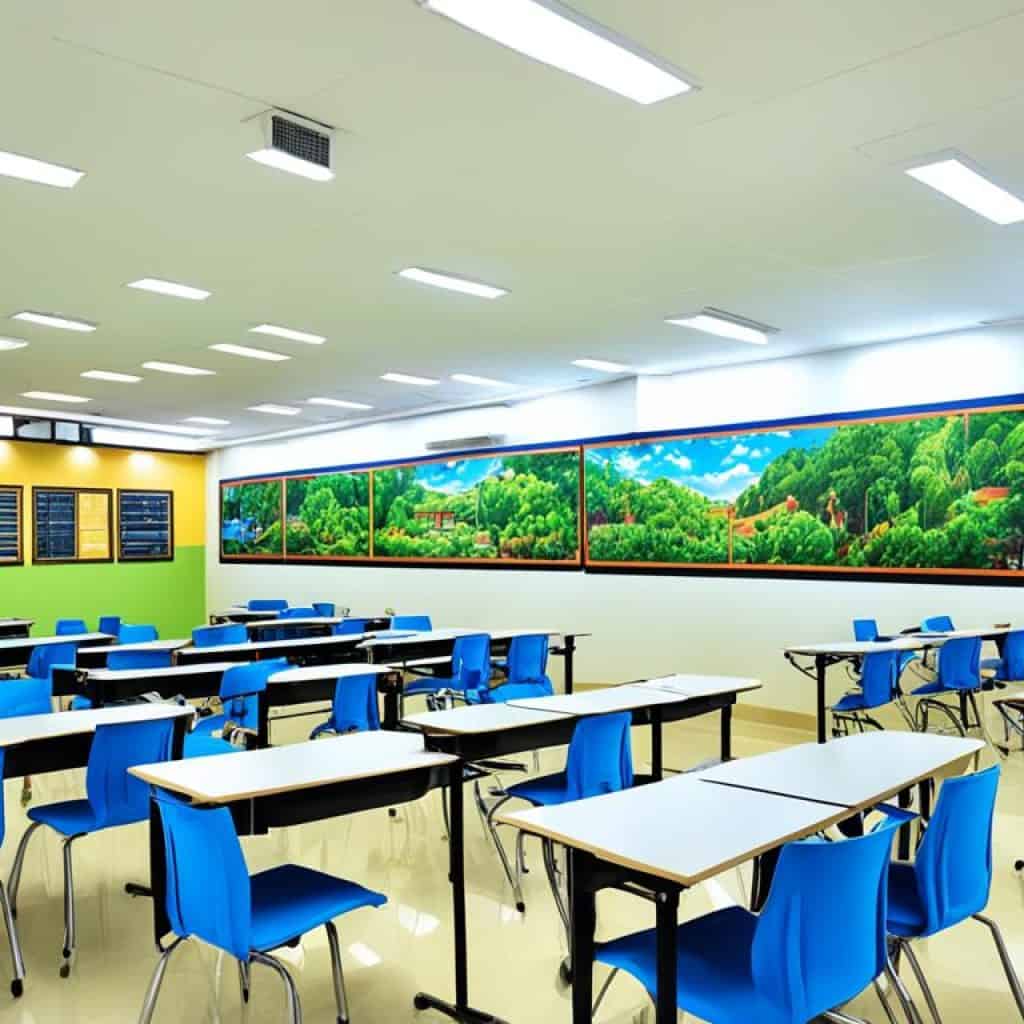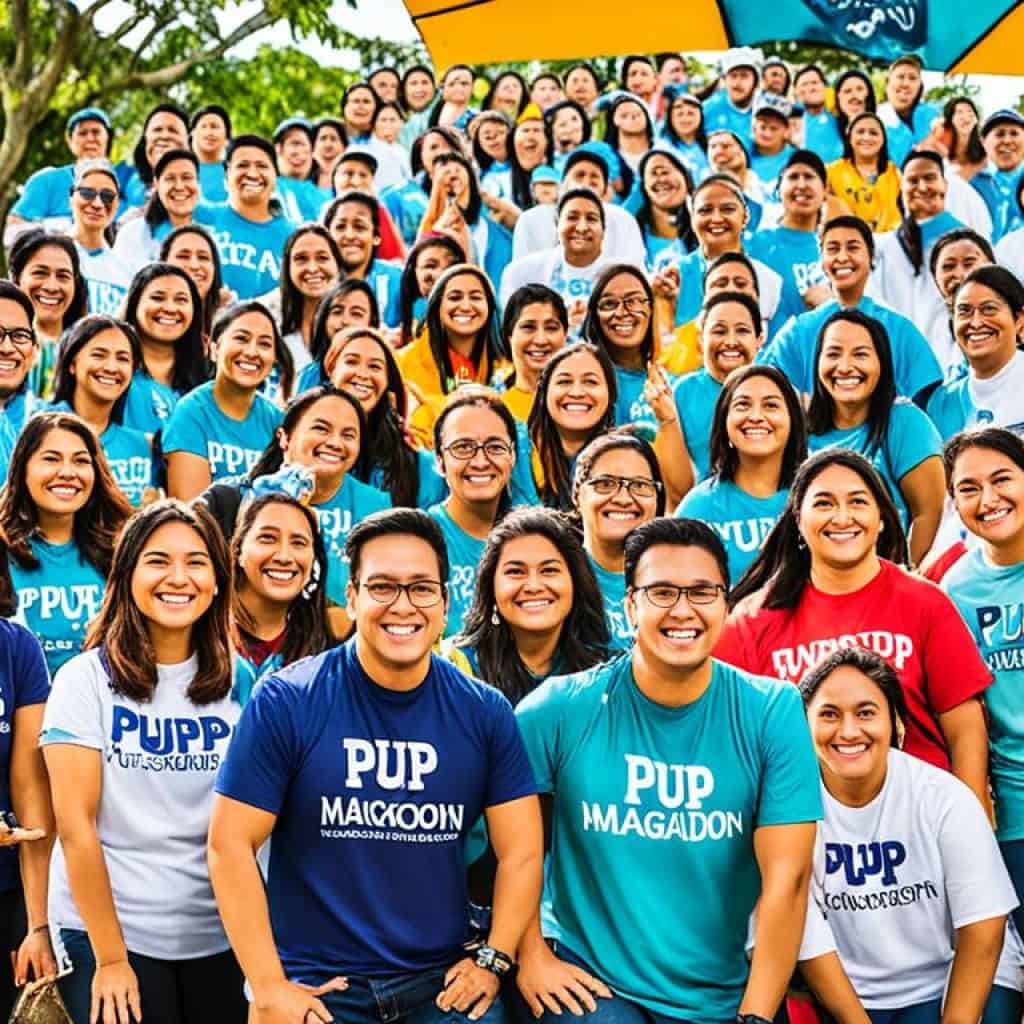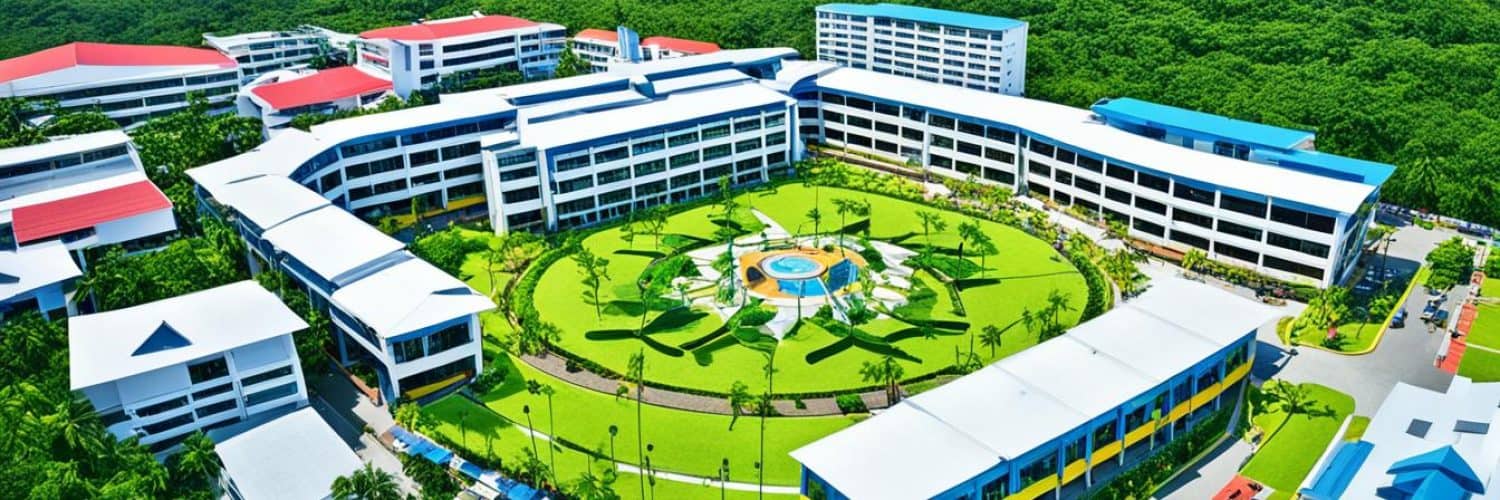Have you ever wondered where academic excellence and innovation intersect? Look no further than the Polytechnic University of the Philippines (PUP) Maragondon campus. Situated in Maragondon, Cavite, this campus offers a wide range of programs and courses designed to unlock your potential and propel you towards success. But what sets PUP Maragondon apart from other institutions? What makes it a hub for innovation and excellence?
Discover the answers as we delve into the world of PUP Maragondon. From its diverse range of courses and state-of-the-art facilities to its commitment to promoting academic excellence and integrating technology in education, PUP Maragondon is shaping the future of education and empowering students to excel in their chosen fields.
Key Takeaways:
- PUP Maragondon offers a wide range of programs and courses to meet the needs of diverse disciplines.
- The campus is equipped with state-of-the-art facilities to create an ideal learning environment.
- PUP Maragondon is committed to promoting academic excellence and innovation.
- Integrating technology in education is a priority for PUP Maragondon.
- The campus provides opportunities for students to excel and prepare for successful careers.
PUP Maragondon Courses: A Wide Array of Options
PUP Maragondon offers a diverse selection of courses spanning various disciplines, providing students with a wide array of options to explore and pursue their passions. With a commitment to academic excellence, the university equips students with the necessary knowledge and skills to excel in their chosen professions.
Whether students are interested in engineering, technology, business, or management, PUP Maragondon has a program tailored to their interests. Some of the popular courses available include:
- Civil Engineering
- Electrical Engineering
- Business Administration
- Hospitality Management
These programs are designed to cultivate students’ critical thinking, problem-solving, and leadership abilities, empowering them to thrive in the ever-evolving global landscape. With a focus on hands-on experience and practical application, students gain real-world insights and develop the skills necessary for success in their future careers.
“The courses offered at PUP Maragondon are designed to cater to the needs of industries and provide students with the knowledge and skills required to succeed in the professional world. The university’s commitment to academic excellence ensures that graduates are well-prepared to tackle the challenges of their chosen fields.”
With a faculty composed of experienced professionals and industry experts, students receive guidance and mentorship from seasoned professionals who understand the demands and expectations of the workforce. The courses at PUP Maragondon foster a holistic learning environment, integrating theoretical knowledge with practical application to prepare students for the complexities of their respective industries.
By offering a wide range of courses, PUP Maragondon empowers students to chart their own path and pursue their passions. The university’s commitment to academic excellence, innovation, and industry relevance sets the foundation for students to thrive in their chosen fields and make a positive impact in society.
Admission Requirements: How to Get Into PUP Maragondon
Getting into PUP Maragondon is an exciting opportunity for students to pursue their dreams and unlock their potential. However, there are certain admission requirements that must be met to secure a spot in this esteemed institution.
PUP Maragondon admission requirements vary depending on the chosen program. Nevertheless, there are common prerequisites that applicants should anticipate. Here’s a breakdown of the typical admission requirements:
- A high school diploma or its equivalent is a fundamental requirement for all programs offered at PUP Maragondon.
- Applicants may need to pass an entrance examination designed to assess their academic readiness and potential for success.
- An interview may also be conducted to evaluate the applicant’s motivation, goals, and suitability for the chosen program.
- Supporting documents such as academic records, identification cards, and birth certificates may be required during the application process.
While these requirements provide a general overview, it’s essential to consult the specific admission guidelines for each program to ensure all necessary documents and qualifications are met. Adherence to these admission requirements increases the chances of gaining acceptance into the highly respected PUP Maragondon.
“The doors of opportunity at PUP Maragondon are open to those who aspire for educational excellence. By fulfilling the admission requirements, you are taking the first step towards a fulfilling academic journey.”
Programs and Facilities: Promoting Academic Excellence
PUP Maragondon is dedicated to providing a superior academic experience for its students. With a wide range of programs designed to meet the demands of today’s industries, students can choose the path that aligns with their career aspirations. The university offers programs in various disciplines, including engineering, technology, business, and hospitality management. These comprehensive programs equip students with the knowledge and skills needed to excel in the real world.

In addition to its exceptional programs, PUP Maragondon boasts state-of-the-art facilities that enhance the learning environment. The campus features well-equipped classrooms, cutting-edge laboratories, extensive libraries, and vibrant student centers. These facilities are thoughtfully designed to create a conducive atmosphere for academic growth and personal development.
| Facilities | Description |
|---|---|
| Classrooms | Modern classrooms with advanced audiovisual technology to facilitate interactive learning. |
| Laboratories | State-of-the-art labs equipped with advanced equipment and tools for hands-on practical training. |
| Libraries | Extensive libraries with a vast collection of books, journals, and online resources to support research and study. |
| Student Centers | Vibrant student centers that serve as hubs for extracurricular activities, socializing, and collaboration. |
These exceptional facilities not only support academic excellence but also foster a sense of community and holistic development among students. With PUP Maragondon’s outstanding programs and state-of-the-art facilities, students can thrive academically and beyond.
Location and Contact Information: Easy Access and Connectivity
PUP Maragondon is conveniently located in Maragondon, Cavite, providing easy access to local and international students. Situated in a peaceful and conducive environment, the campus offers an ideal setting for learning and personal growth.
For inquiries and more information about PUP Maragondon, interested individuals can contact the university through the following channels:
Phone: Maragondon PUP Contact Number
For those planning a visit, the campus is easily accessible by public transportation and can be reached through the following routes:
- By Car: Take the Cavite Expressway (CAVITEX) and exit at Ternate-Nasugbu Road. Continue straight until reaching Maragondon-Caylabne Road, where PUP Maragondon is located.
- By Bus: Ride a bus bound for Ternate, Maragondon. From the town proper, take a tricycle or jeepney to PUP Maragondon.
| Location | Accessibility |
|---|---|
| Maragondon, Cavite | Easily accessible by car, bus, and other public transportation |
Enhanced Governance Operation System: A Study’s Findings
A comprehensive study was conducted to assess the governance operation system of locally-funded PUP campuses, including PUP Maragondon. This assessment aimed to evaluate how governance is carried out by the local chief executives of Local Government Units in terms of school administration, facilities, curriculum, research, and other operations.
The findings of the study shed light on the present status and setup of locally-funded PUP campuses. These insights serve as a valuable model for other LGU-funded schools in the Philippines, providing practical recommendations for enhancing the governance operation system.
“The assessment of the governance operation system in locally-funded PUP campuses has uncovered important areas of improvement. The study reveals significant strengths and identifies opportunities for refinement, ensuring the delivery of quality education to students.”
The study encompasses various aspects of the governance operation system, ranging from administrative processes to infrastructure development. By thoroughly examining these areas, the study aimed to drive positive changes that would benefit both students and the entire PUP community.
Key Areas of Assessment:
- School Administration
- Facilities
- Curriculum
- Research
- Other Operations
The findings of the assessment are instrumental in shaping the future of locally-funded PUP campuses, promoting efficient governance and ensuring the best possible educational experience for students.
By implementing the study’s recommendations and capitalizing on its insights, PUP Maragondon and other LGU-funded schools can enhance their governance operation systems and continue to provide quality education that empowers students to excel.
Stakeholder Profile: Who Makes Up the PUP Maragondon Community
At PUP Maragondon, the vibrant community is made up of various stakeholders who play a vital role in shaping the university’s success. These stakeholders include:
- Faculty members: The dedicated and passionate academic professionals who impart knowledge and guide students in their academic journey.
- Students: The enthusiastic learners who bring life to the campus and contribute to the vibrant academic and social atmosphere.
- LGU officials and staff: The Local Government Unit officials and their supporting staff who collaborate closely with the university to ensure effective governance and smooth operation of the campus.
- Campus administrative staff: The committed administrative personnel who provide essential support services, ensuring the efficient functioning of various administrative tasks.
- PUP Campus Directors: The esteemed leaders who provide strategic direction and oversee the overall operations of the campus.
In terms of geographical representation, the majority of stakeholders hail from Region IV-A, with many residing in the vicinity of the Maragondon campus. Additionally, most stakeholders come from Class A municipalities, receiving campus funding from the Municipal Government. This diverse group of stakeholders brings together a wealth of knowledge, skills, and perspectives, fostering a collaborative and inclusive learning environment.
By actively engaging with the PUP Maragondon community, the university ensures that the needs and aspirations of all stakeholders are considered, and together they contribute to the continuous growth and success of the institution.

Enhancing Collaboration for Holistic Development
“The collaboration between stakeholders at PUP Maragondon is crucial for the holistic development of the university. By working together, we create an environment that nurtures creativity, critical thinking, and lifelong learning.” – PUP Campus Director
Assessment of Governance Operation System: Key Findings
The assessment of the governance operation system in locally-funded PUP campuses, including PUP Maragondon, revealed positive ratings in various areas. Stakeholders assessed academic services, administrative services, campus location, quality of graduates, classroom facilities, and extension projects as “very satisfactory.” These aspects demonstrate the dedication of PUP Maragondon to providing quality education and creating an environment conducive to learning and growth.
However, the assessment also identified areas that stakeholders rated as “satisfactory.” These include student services, auditoriums, libraries, research capabilities, laboratory facilities, and sports facilities. While these areas meet the satisfactory standard, PUP Maragondon can further enhance these services and facilities to provide an even more enriching experience for its students.
The lowest rating, interpreted as “fair,” was given to medical facilities. This finding highlights the opportunity for improvement in the health services offered within the campus, ensuring the well-being and accessibility of healthcare for PUP Maragondon students.
“We are thrilled to see the positive ratings in various aspects of the governance operation system. This assessment provides valuable insights into the strengths and areas for improvement, guiding our efforts to enhance the overall student experience at PUP Maragondon.”
– PUP Maragondon Campus Director
By addressing the areas for improvement and continuously investing in the development of facilities and services, PUP Maragondon aims to elevate the governance operation system and provide an exceptional learning environment for its students.
| Aspect | Rating |
|---|---|
| Academic Services | Very Satisfactory |
| Administrative Services | Very Satisfactory |
| Campus Location | Very Satisfactory |
| Quality of Graduates | Very Satisfactory |
| Classroom Facilities | Very Satisfactory |
| Extension Projects | Very Satisfactory |
| Student Services | Satisfactory |
| Auditoriums | Satisfactory |
| Libraries | Satisfactory |
| Research Capabilities | Satisfactory |
| Laboratory Facilities | Satisfactory |
| Sports Facilities | Satisfactory |
| Medical Facilities | Fair |
Significant Differences in Assessment: Factors Influencing Ratings
The assessment of the governance operation system in locally-funded PUP campuses has revealed interesting findings. The ratings obtained varied significantly based on several factors. These factors include stakeholder classification, region, school population, source of funding, and the number of programs offered. It is crucial to consider these specific context and characteristics of each campus while assessing their governance operation system.
| Factors | Differences |
|---|---|
| Stakeholder Classification | Influences the perception of how governance is carried out and impacts overall ratings. |
| Region | Different regions may have diverse guidelines and policies, leading to varying assessments. |
| School Population | The size of the student body can impact the effectiveness of governance measures and influence ratings. |
| Source of Funding | Different sources of funding may result in different levels of resources available, affecting the overall assessment. |
| Number of Programs Offered | More extensive program offerings may require additional resources, potentially influencing ratings. |
These significant differences emphasize the need for a comprehensive and contextual evaluation of governance operation systems in locally-funded PUP campuses. By taking into account the unique circumstances of each campus, stakeholders can better understand the strengths and weaknesses of the system, leading to targeted improvements and enhanced overall performance.
Challenges and Proposed Enhancements
The assessment of the governance operation system in locally-funded PUP campuses has shed light on several challenges that stakeholders face. These challenges encompass various aspects of the system and require attention in order to ensure its effectiveness and efficiency. Proposed enhancements have been identified based on the study’s findings, aiming to address these challenges and further improve the overall governance operation system.
“The assessment of the governance operation system in locally-funded PUP campuses has provided valuable insights into the existing challenges that stakeholders encounter. By understanding and actively addressing these challenges, we can work towards creating a more robust and inclusive governance system.”
Challenges Faced in the Governance Operation System
During the assessment, several challenges surfaced, highlighting areas that require improvement. These challenges include:
- Inadequate budget allocation, hindering the implementation of necessary initiatives and improvements.
- Slow processing of funding requests, leading to delays in addressing immediate needs and concerns.
- Limited availability of shuttle services, creating difficulties for students and staff in commuting to and from the campus.
- Lack of effective coordination with the Local Government Unit (LGU), impacting seamless collaboration and resource allocation.
Proposed Enhancements for the Governance Operation System
Building upon the study’s findings, several proposed enhancements have been formulated to address the identified challenges and elevate the governance operation system. These enhancements include:
- Streamlining the budget allocation process to ensure equitable distribution of resources and timely implementation of initiatives.
- Implementing efficient procedures for processing funding requests to expedite the allocation of funds and address urgent needs promptly.
- Expanding accessibility and availability of shuttle services to accommodate the commuting needs of students and staff.
- Promoting stronger communication and collaboration between the PUP Maragondon campus and the LGU to foster a more cohesive partnership and maximize resource utilization.
By implementing these enhancements, PUP Maragondon can overcome existing challenges and strengthen its governance operation system, ultimately providing a more conducive and supportive environment for its stakeholders.
Future Directions and Recommendations
Based on the conclusions drawn from the Assessment of Governance Operation System in locally-funded PUP campuses, it is evident that there are areas for improvement and opportunities for future development. To ensure the quality and excellence of the governance operation system, the study suggests the following future directions:
- Conduct a comparative study: To gain further insights and benchmark performance, a comparative study of locally-funded campuses should be undertaken. This study would allow for a comprehensive analysis of best practices and areas that require attention.
- Focus on low-rated indicators: By focusing on indicators that obtained lower ratings, interventions can be targeted where they are most needed. This approach enables a more precise and effective allocation of resources.
- Address specific needs: Identifying specific needs such as specialized laboratories and allocating resources to fulfill these requirements is crucial. This ensures that the governance operation system aligns with the evolving demands of the education sector.
- Continuous monitoring and evaluation: Regular monitoring and evaluation are essential to track progress and identify areas for improvement. Institutions should establish mechanisms and systems to gather feedback from stakeholders consistently.
- Upgrading program content and delivery: As the education landscape evolves, it is crucial to regularly review and upgrade program content and delivery methods. This includes integrating emerging technologies and pedagogical approaches to enhance the overall learning experience.
Quote:
“By implementing these future directions and recommendations, locally-funded PUP campuses can strive for excellence and provide a more robust and effective governance operation system. Continuous improvement is key to ensuring that students receive the highest quality education and are equipped with the necessary skills for the dynamic global landscape.”
By implementing these future directions and recommendations, locally-funded PUP campuses can strive for excellence and provide a more robust and effective governance operation system. Continuous improvement is key to ensuring that students receive the highest quality education and are equipped with the necessary skills for the dynamic global landscape.
Importance of ICT Integration in Distance Education
The integration of Information and Communication Technology (ICT) in distance education has become increasingly important. With the advancement of technology, ICT has revolutionized the way education is delivered, providing students with flexible learning opportunities regardless of their geographical location.
At the Polytechnic University of the Philippines (PUP), a study was conducted to highlight the crucial role of ICT in enhancing teaching and learning experiences for course specialists handling Open University classes in the context of distance education. The findings of the study underscored the need for course specialists to have a high level of confidence in utilizing various ICT applications and seamlessly integrating them into their virtual classrooms.
Proper training programs and ongoing support are of utmost importance to ensure that course specialists are well-equipped and prepared to deliver engaging and effective online education. This includes training on utilizing learning management systems, virtual collaboration tools, and multimedia resources to facilitate interactive and immersive learning experiences.
The integration of ICT in distance education offers numerous benefits and opportunities. It enables students to access educational materials, participate in virtual discussions, and submit assignments through online platforms. Additionally, it fosters collaborative learning and empowers students to take ownership of their learning experiences by providing them with the flexibility to set their own pace and study at their convenience.
Furthermore, ICT integration in distance education promotes the utilization of e-learning resources. These resources can include online libraries, digital textbooks, interactive simulations, and multimedia materials that enhance students’ understanding and engagement with the course content.
Ultimately, a robust ICT integration strategy in distance education not only supports and enhances the learning experiences of students but also empowers educators to deliver quality education in a virtual setting.
Benefits of ICT Integration in Distance Education
- Flexible learning opportunities for students
- Enhanced engagement and interactivity in virtual classrooms
- Access to a wide range of e-learning resources
- Promotes collaborative learning experiences
- Supports personalized and self-paced learning
- Enables efficient communication and feedback between educators and students
ICT integration in distance education enables students to access education regardless of their geographical location, providing equal opportunities for learning and personal growth.
Comparison of Traditional Education and ICT-Integrated Distance Education
| Aspects | Traditional Education | ICT-Integrated Distance Education |
|---|---|---|
| Geographical limitations | Physical attendance required | No geographical barriers; learn from anywhere |
| Flexibility | Rigid schedules and fixed location | Flexible study hours and location independence |
| Access to educational resources | Dependent on physical libraries and resources | Wide array of online resources accessible 24/7 |
| Interaction and collaboration | Face-to-face interaction with peers and educators | Virtual discussions, collaborative projects, and online forums |
| Learning pace | Structured syllabus and fixed learning pace | Self-paced learning based on individual needs |
In conclusion, the integration of ICT in distance education plays a vital role in providing accessible and quality education for students. PUP recognizes the importance of ICT integration in delivering effective online courses and continues to prioritize the development of course specialists’ skills and confidence in utilizing ICT tools and resources. By embracing technology and leveraging its capabilities, PUP aims to create an engaging and immersive virtual learning environment that empowers students to excel in their educational journey.
The Role of Technology in the Future of DE System
The future of Distance Education (DE) systems is intrinsically linked to the evolving landscape of education and the increasing role of technology. As the world becomes more interconnected and digitally-driven, technology plays a pivotal role in shaping the way education is delivered and accessed.
One of the key aspects highlighted in the study is the importance of preparing faculty members or course specialists in teaching via online methods. As distance education continues to gain traction, educators must adapt and enhance their digital literacy skills to effectively engage and support students in the virtual learning environment.
The integration of technology in education is crucial for providing a gratifying experience for both students and course specialists. E-learning platforms, multimedia tools, and interactive resources offer new avenues for knowledge acquisition and engagement. By incorporating technology, DE systems can provide students with flexible learning opportunities, allowing them to access educational resources anytime, anywhere.
“Technology is not just a tool; it can become integrated into the educational process, creating a productive and enjoyable learning experience for students and educators alike.”
Moreover, technology enables DE systems to overcome barriers to education. It bridges the geographical distance between instructors and learners, making education accessible to individuals in remote areas or those with physical limitations. By leveraging technology, educational institutions can create inclusive learning environments that cater to diverse learning styles and needs.
Advantages of Technology Integration in DE:
Technology integration in DE systems provides numerous advantages, such as:
- Enhanced accessibility to educational resources and materials
- Improved communication and collaboration among students and faculty
- Personalized and adaptive learning experiences
- Real-time feedback and assessment
- Efficient and streamlined administrative processes
Challenges in Embracing Technology:
While technology plays a pivotal role in the future of DE systems, there are challenges that need to be addressed. Some of these challenges include:
- Ensuring equitable access to technology for all students
- Providing comprehensive training and support for faculty members
- Maintaining data privacy and cybersecurity
- Addressing the digital divide and socio-economic disparities
By proactively addressing these challenges, educational institutions can create an inclusive and technologically-enabled environment that fosters effective distance learning experiences.

| Benefits | Description |
|---|---|
| Increased access to educational resources | Technology enables students to access a wide range of digital learning materials, including e-books, online lectures, and interactive simulations. |
| Enhanced engagement and interactivity | Interactive multimedia tools, discussion boards, and collaborative platforms promote active participation and engagement among students. |
| Flexibility and convenience | Technology allows students to learn at their own pace and convenience, eliminating time and geographical constraints. |
| Personalized learning experiences | Adaptive learning platforms and intelligent algorithms provide personalized learning pathways tailored to individual student’s needs and preferences. |
| Real-time feedback and assessment | Through online platforms, instructors can provide immediate feedback and assessments, fostering continuous improvement and learning. |
Conclusion
The Polytechnic University of the Philippines (PUP) Maragondon campus, located in Maragondon, Cavite, is a place of academic excellence and innovation. With a wide range of courses, state-of-the-art facilities, and a commitment to integrating technology in education, PUP Maragondon offers students the perfect environment to excel in their chosen fields.
The assessment of the governance operation system and the study on ICT integration in distance education exemplify PUP Maragondon’s dedication to continuous improvement and its mission to provide quality education. By conducting thorough evaluations and embracing technological advancements, the university ensures that students receive the best possible learning experience.
As a symbol of academic distinction, PUP Maragondon empowers students to unlock their full potential and prepares them for successful careers. With its focus on academic excellence, innovative teaching methods, and a commitment to the continuous development of its facilities, PUP Maragondon is at the forefront of higher education in the Philippines.


















Add comment